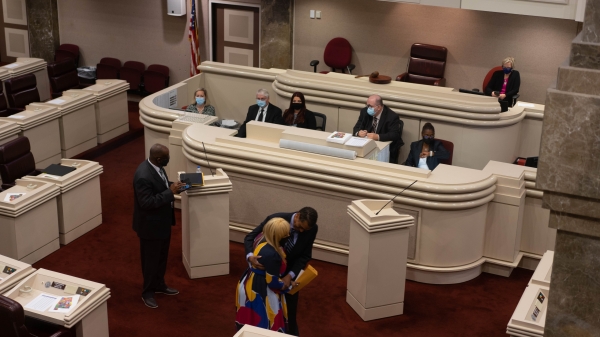By Brandon Moseley
Alabama Political Reporter
Alabama has been one of the last states to embrace the growing charter school movement that is sweeping the nation; but that is set to change if Senate President Del Marsh (R-Anniston) and Speaker of the House Mike Hubbard (R-Auburn) have their way. Charter schools are one of the highest priorities of the Republican super majority and their first draft of a charter school bill has been written and sent to legislators for their review.
In the 2013 legislative session the legislature passed the Alabama Accountability Act, which let students at Alabama’s worst performing schools have some degree of choice through scholarships to attend another public school or a private school…..if they can find one they like that will accept their student. Most families find that they are still trapped in their neighborhood schools, because their school does not meet the stringent standards required under the Accountability Act.
On Thursday, February 19, Speaker Hubbard forwarded a copy of the 52 page charter school bill to legislators, Speaker Hubbard wrote, “Please find attached the School Choice and Student Opportunity Act, or the public charter school legislation, that will be sponsored by Senate President Pro Tem Del Marsh and handled by Representative Terri Collins in the House. This bill has been a work in progress that has included many discussions with the education community in addition to research on best practices in other states.”
Speaker Hubbard wrote to his fellow legislators, “In order to ensure you have the opportunity to review the bill and ask questions ahead of session, we wanted to get it out to you as early as possible. Rep. Collins is looking forward to working with each of you on this bill. Please feel free to reach out and offer input, feedback, or any additional thoughts on the bill. This legislation will be a priority for us, but it is also a priority to work through your concerns.”
The School Choice and 8 Student Opportunity Act creates the Alabama Public Charter School Commission and provides for an application process for establishing public charter schools and sets requirements and conditions for establishing a charter school.
The bill reads, “The Legislature finds and declares all of the following: (1) It is in the best interests of the people of Alabama to provide all children with access to high quality public schools. (2) It is necessary to continue to search for ways to strengthen the academic performance of elementary and secondary public school students. (3) Different students learn differently and public schools should have the ability to customize programs to fit the needs of individual students. (4) Those who know students best, parents and educators, make the best education-related decisions regarding their students. (5) Parents and local educators have a right and responsibility to actively participate in the educational institutions that serve the children of Alabama. (6) Public school programs, whenever possible, should be customized to fit the needs of individual children. (7) Students of all backgrounds are entitled to access to a high quality education. (8) Therefore, with this act, the Legislature intends to accomplish all of the following: a. Provide school systems and communities with additional tools that may be used to better meet the educational needs of a diverse student population. b. Encourage innovative educational ideas that improve student learning for students at all academic levels. c. Empower educators to be nimble and strategic in their decisions on behalf of students. d. Provide additional high quality educational options to all students, especially students in low performing schools. e. Create public schools with freedom and flexibility in exchange for exceptional results. f. Foster tools and strategies to close achievement gaps between high-performing and low-performing groups of public school students.”
The bill allows school system to convert existing schools to a charter schools. The bill defines those as “conversion public charter schools.” A conversion public charter school is required to adopt and maintain a policy giving enrollment preference to students who reside within the former attendance area of the public school. If a neighborhood school converts to a charter school, do all the students in that neighborhood still get to go to that school?
Under the terms of the bill a, ‘public charter school’ is a public school that satisfies all of the following: “a. Has autonomy over key decisions including, but not limited to, decisions concerning finance, personnel, scheduling, curriculum, instruction, and procurement. b. Is governed by an independent 501(c)(3) governing board. c. Is established and operated under the terms of a charter contract between the governing board and its authorizer, in accordance with this act. d. Is a school to which parents choose to send their student. e. Is a school that admits students on the basis of a random selection process if more students attempt to enroll for admission than can be accommodated. f. Provides an educational program that satisfies all of the following: 1. Includes any grade or grades from prekindergarten 3 to 12th grade. 2. May include a specific academic approach or theme including, but not limited to, vocational and technical training; virtual education; visual and performing arts; liberal arts and classical education; or science, mathematics, and technology. 3. Operates in pursuit of a specific set of 10 educational objectives as defined in its charter contract, such as college preparation. 4. Operates under the oversight of its authorizer in accordance with its charter contract.
A start-up charter school is a “public charter school that did not exist as a non-charter public school prior to becoming a public charter school.”
School systems can not require any student enrolled in the school system to attend a start-up public charter school. A public charter school shall not limit admission based on ethnicity, national origin, religion, gender, income level, disability, proficiency in the English language, or academic or athletic ability. Students are defined as any child within the state of Alabama.
A public charter school may limit admission to students within a given age group or grade level and may be organized around a special emphasis, theme, or concept as stated in the in the school’s charter application, but fluency or competence in the theme may not be used as a standard for 5 enrollment. A public charter school shall enroll all students who wish to attend the school, unless the number of students exceeds the capacity of the building identified for the public charter school. If the capacity of the building is insufficient to enroll all students who wish to attend a start-up public charter school, the school shall select students through a random selection process, but preference is given to enroll students who reside within the school system in which the public charter school is located. If the school has additional capacity after admitting students from the local school system, then the school shall admit any students without regard to their residency by a random selection process. Enrollment preference will be given to students enrolled in the public charter school the previous school year and to siblings of students already enrolled in the public charter school. A public charter school may give enrollment preference to children of a public charter school’s founders, governing board members, and full-time employees, so long as they constitute no more than 10 percent of the school’s total student population. This does not preclude the formation of a public charter school whose mission is focused on serving special education students, students of the same gender, students who pose such severe disciplinary programs that they warrant a specific educational program, or students who are at risk of academic failure.
Critics would like to see charter schools implemented on a limited trial basis. Proponents argue that Alabama lags too far behind the rest of the country to delay and benefits from learning about what worked and what didn’t work in the other states. The Alabama Political Reporter will have more on this bill on Monday.
























































